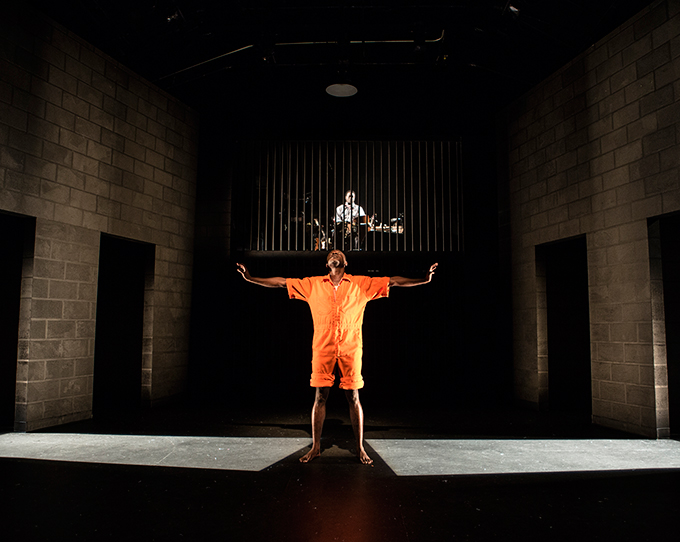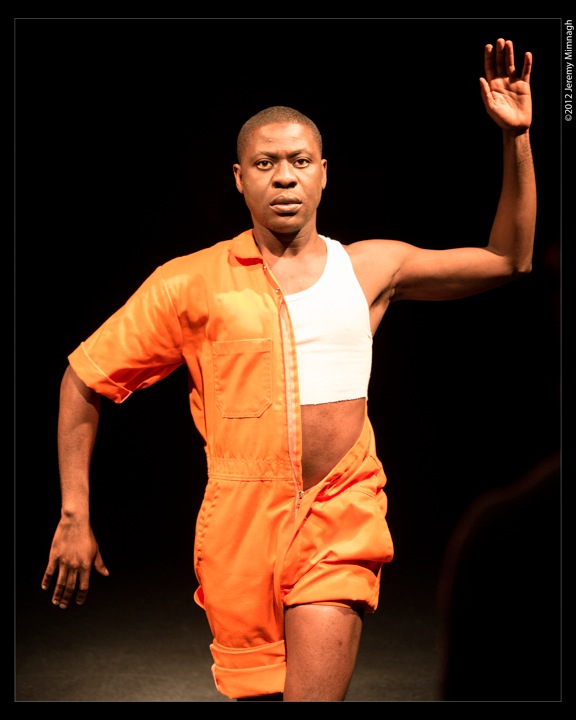Obaaberima is the show behind all the buzz in town. Winner of the Dora award in 2013 for Best Production, it comes to Vancouver on March 24 and runs for 11 nights. Tawiah M’Carthy is the man behind the brave show. It tells the story of a gay Ghanaian man, as he serves time in a Canadian prison. The show explores sexuality, gender, race and the immigrant experience. Incorporating African traditional theatre, music, dance and Canadian narrative structures, the play is attracting a lot of attention.
Born in Ghana, Tawiah moved to Canada when he was fifteen. He went on to complete a BFA in theatre at York University, Toronto. Ghana plays an important role in Tawiah’s work. “I am 31 years old” he says, “and I have spent half my life in Canada and half of it in Ghana. I still have family back home and try as much as possible to stay connected to my roots because my roots serve my art”. His list of performance credits got longer and longer through high school and university. Up until he was fresh out of university, that is. Tawiah started having difficulties finding an agent and being cast in productions. His unconventional accent and untraditional look did not fit in anywhere. The Canadian arts scene leaves much to be desired when it comes to diversity. “No one was casting me in their shows because I had an accent and I looked pretty African,” Tawiah says, “the idea then became, okay I’ll start creating work for myself if no one is telling stories with characters that I could play. That is what got me into writing because no one was writing for me”. It also took tremendous support from people in the industry, “in my experience it takes people who believe in you. It takes people who are willing to take a risk. For example, Brendan Healy the artistic director of Buddies in Bad Times, saw my work and took a chance on me. Even my drama teacher in high school believed in me. Jill Keiley at the National Arts Centre (NAC), where I’m doing the show right now, supported me. Evalyn Parry who directed the show, Joel and Sarah the artistic directors at NAC, Heather at the Cultch. Everyone.”
Tawiah started to write to tell his own stories. He wrote Kente Cloth in university, which was about a gay man getting ready for his wedding. The man was deciding between wearing a traditional outfit or a suit and tie for the occasion. Fuelled by the positive response for Kente Cloth, Tawiah embarked upon creating Obaaberima. “I had written a poem called Red High Heels. It was about a young boy standing in front of his mother’s mirror, trying on his mother’s shoes. I had been looking through a magazine when I saw a picture of a black woman. She was standing in a red dress. Her feet were painted red. The image stayed with me. It eventually led to the poem and the poem led to Obaaberima.” The entire writing process took Tawiah three and a half years during which he grew more into himself.
Obaaberima deals primarily with growing up gay in Ghana. Tawiah feels things are easier now than back when he was growing up, as “there is more of a vocabulary and more of a conversation around it”. With a predominantly Christian and Muslim population, Ghana has been very resistant to gay rights. “There is an almost secretive gay community in Ghana. You’re just not allowed to talk about it, display it or show it off.” When asked about being able to take Obaaberima to Ghana he sounded sceptical, “I would love to take it back home but at the moment I don’t think that’s going to happen. The title alone I can see making other Ghanaians uncomfortable.”
Coming to Canada allowed Tawiah the space and environment he needed to come out as gay. “It took a while for me to come out. Aside from the cultural struggle in Canada there was also my internal religious struggle. I kept thinking this is not right. There is still a lot of religious persecution when it comes to gay rights.” Despite his religious struggle Tawiah is a believer of God. He has found a way to be gay and to continue having God in his life. “I have faith in God and I know that God accepts me for who I am. Getting to that place was itself a journey. Finding art became the anchor for me. I would get characters to play in university but would hit blocks because I had blocks in my personal life. Writing Obaaberima gave me confidence and helped me resolve those blocks.”
Despite the struggles Tawiah has faced due too his race and sexuality, he is optimistic about the theatre arts. “The theatre is such an intimate place. Theatre is all about community and it’s where the conversation gets started. The conversation gets taken with the audience, outside the theatre and into their everyday lives. Art is very important in activating people’s awareness of social issues.”
Tawiah is already working on his next project, with Brad Cook, a key figure at Stratford, that focuses on race and reconciliation. “It’s about a white man and a black man who have to reconcile the mistakes of their fathers, and how they get past history to become brothers. We’re doing a workshop presentation of it in August in Kitchener.”
For now we have Obaaberima to look forward to. It plays at the Cultch from March 24 to April 4. Obaaberima is an important step for Canadian theatre. Your trip to the show will champion the cause of diversity for an infinitely richer theatre culture in our cities.
-Prachi Kamble
(Printed with the permission of Fame Blog Canada where it was initially published).


